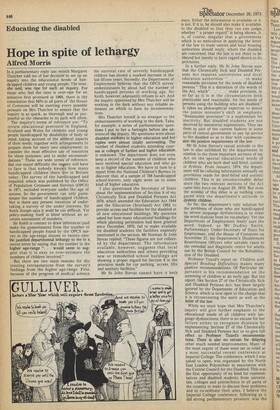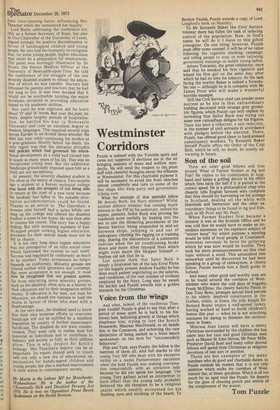Educating the disabled
Hope in spite of lethargy
Alfred Morris
In a parliamentary reply last month Margaret Thatcher told me of her decision' to set up an inquiry into the educational needs of handicapped children and young people. The time, she said, was ripe for such an inquiry. For those who feel the time is over-ripe for an initiative first promised in 1968, there is the consolation that MPs in all parts of the House of Commons will be exerting every possible pressure on Mrs Thatcher to ensure that the inquiry is as quick, as thorotigh and as purposeful as the obstacles in its path will allow.
The inquiry's terms of reference are: "To review educational provision in England, Scotland and Wales for children and young people handicapped by disabilities of body or mind, taking account of the nriklical aspects of their needs, together with arl'angements to prepare them for entry into employment; to consider the most effective use of resources for these purposes: and to make recommendations." These are wide terms of reference. But one major difficulty the inquiry will have to face is that nobody knows how many handicapped children there Ure in Britain today. The survey of the handicapped and impaired, which was published by the Office of Population Censuses and Surveys (OPCS) in 1971, excluded everyone under the age of sixteen. So the government can only guesstimate the number of handicapped children. Nor is there any present intention of undertaking a survey of the under sixteens. Sir Keith Joseph says it wold be too difficult. Yet policy-making itself is blind without an accurate assessment of numbers.
Sir Keith is content to draw inferences (and make his guesstimates) from the number of handicapped people found by the OPCS sur vey in the age-range sixteen to twenty-nine. He justified departmental lethargy to me in a recent letter by saying that the number in the higher age-range ". . . would seem to suggest that it is easy to over-estimate the numbers of children involved."
But there are two main reasons for distrusting extrapolations from the survey's findings from the higher age-range. First, because of the progress of medical science, the survival rate of severely handicapped children has shown a marked increase in the last fifteen years. Secondly, the Department of Employment believes that the OPCS survey underestimates by about half the number of handicapped persons of working age. Sir Keith, however, adamantly refuses to act. And the inquiry appointed by Mrs Thatcher will be working in the dark without any reliable estimates on which to base its recommendations.
Mrs Thatcher herself is no stranger to the embarrassments of working in the dark. Take, for example, a series of parliamentary ques tions I put to her a fortnight before she an nounced the inquiry. My questions were about disabled students in higher education and her' replies were almost totally unrevealing. The number of disabled students attending cour
ses at colleges of further and higher education is unknown. The department does not even keep a record of the number of children who have received special education and who go on to higher education. We have to turn to a report from the National Children's Rureau to discover that, of a sample of 788 handicapped school-leavers, only eight went on to some kind of higher education.
I also questioned the Secretary of State about the implementation of Section 8 of my 'Chronically Sick and Disabled Persons Act 1970, which amended the Education Act 1944 and the Education (Scotland) Act 1962 to provide access and facilities for the disabled at all new educational buildings. My question asked her how many educational buildings for which planning permission had been granted since December, 1970, fail to make available for disabled students the facilities expressly mentioned in the section. Mr Norman St John Stevas replied: "These figures are not collected by the department. The information available, however, suggests that local education authorities and others providing new or remodelled school buildings are showing a proper regard for Section 8 in the provision made for car parking, access, lifts and sanitary facilities."
Mr St John Stevas cannot have it both
ways. Either the information is available or it is not. If it is, he should also make it available to the disabled so that they too can judge, whether" a proper regard" is being shown. It is, of course, singular that a government which is so meticulous in applying the letter of the law to trade unions and local housing authorities should imply, where the disabled are concerned, that the law is not there to be obeyed but merely to have regard shown to its provisions.
In a further reply, Mr St John Stevas says that the Chronically Sick and Disabled Persons Act requires universities and local education authorities " . . . to make reasonable provision for the needs of disabled persons." This is a distortion of the words of the Act, which" . . . make provision, in so far as it is in the circumstances both practicable and reasonable, for the needs of persons using the building who are disabled." It takes no philosophical expertise to detect the junior minister's shift in emphasis. "Reasonable provision" is a euphemism for inactivity. But disabled students are not deceived by ministerial euphemisms. They see them as part of the current fashion in some parts of central government to pay lip service to the disabled so as to blur with condescension the positive requirements of the law.
Mr St John Stevas's casual attitude to the law is also exhibited by the department in relation to the three important sections of my Act on the special educational needs of children who are both deaf and blind, autistic or dyslexic. From January, 1974, the department will be collating information annually on provisions made for deaf-blind and autistic children. This is an unconscionable delay since the two relevant sections of the Act came into force on August 29, 1970. But even the scandal of this delay is as nothing compared with the department's attitude to dyslexic children. So far, the department's only solution for the problems of those who are handicapped by severe language dysfunctions., is to erase the word dyslexia from its vocabulary. Yet the Department of Employment freely uses the word. Indeed, as Mr Dudley Smith, Parliamentary Under-Secretary of State for Employment, told the House of Commons on November 27, his Department's Disablement Resettlement Officers refer suitable cases to the remedial and 'diagnostic centre for adults run by the British Council for the Rehabilitation of the Disabled.
Professor Tizarcl's report on Children with Special Reading Difficulties makes many positive recommendations, Of Particular importance is his recommendation on the screening of children at an early age. But the report, like Section 27 of the Chronically Sick and Disabled Persons Act, has been largely ignored by the Department of Education and Science, which is now open to the charge that it is circumventing the spirit as well as the letter of the law.
While we must hope that Mrs Thatcher's inquiry will give further emphasis to the educational needs of all children with language dysfunctions, there is no excuse for her failure either to recognise dyslexia by implementing Section 27 of the Chronically Sick and Disabled Persons Act or to give full effect to Professor Tizard's recommendations. There is also no excuse for delaying other much needed improvements. Many of the most urgent of these were set in relief at a most successful recent conference at Imperial College. The conference, which I was asked to open, was organised by the North East London Polytechnic in association with the Central Council for the Disabled, This was the first opportunity of its kind for representatives and disabled students from universities, colleges and polytechnics in all parts of the country to meet to discuss their problems and to co-ordinate their aims. I believe the Imperial College conference, following as it did strong parliamentary pressure, was the
main time-ripening factor influencing Mrs Thatcher when she announced her inquiry. Lord Boyle, addressing the conference not only as a former Secretary of State, but also as Vice-Chancellor of the University of Leeds. argued strongly for positive discrimination in favour of handicapped children and young People. He also had the humanity to recognise that, for some young people, higher education May never be a preparation for employment. The point was movingly illustrated by Dr Grant, the Senior Medical Officer at the University of Newcastle-upon-Tyne. He told the conference of the struggle of the one severely disabled student to obtain the education of which he was capable. Doctors had informed his parents and teachers that he had not long to live. It was then decided that it would not be worthwhile tackling the major Problems involved in providing education suited to his academic abilities.
Not until he was eighteen did he learn about '0' and 'A' levels. But over the.next six Years, despite lengthy periods of hospitalisation, he battled his way to Newcastle University and took an excellent degree in modern languages. This required several trips across Europe in art invalid three-wheeler. He died last year while continuing his studies as a post-graduate. Shortly before his death, his only regret was that the defeatist attitudes and policies which had governed his educational development as a child had caused him to waste so many years of his life. This was an exceptional young man. But the additional handicaps gratuitously imposed upon him as a Child are not exceptional.
At present, the severely disabled student is too often at the mercy of chance. Two months ago a student at a Surrey technical college Was faced with the prospect of not being able to return at the start of a new term because his landlady had fallen ill. No suitable alternative accommodation could be found. Thanks to an article in The Guardian, a Woman who herself had a spina bifida son rang up the college and offered the disabled student a room in her home. He was then able to resume his course. This story has a happy. ending. But with increasing numbers of handicapped people seeking higher education. Provision for their special needs must not be left to chance.
It is not very long since higher education Was the prerogative of an elite social class Which fashioned the system to suit itself. Success was regulated by conformity as much as by intellect. Today acceptance no longer depends on conformity. Minority groups are treated neither with ignorance nor contempt. But mere acceptance is not enough. It must how be recognised that our present system, far from educating some minority groups,
such as the disabled, often acts as a barrier to their education and to their integration within society. If education is for man, not man for education, we should not hesitate to load the scales in favour of those who start with a disadvantage. At the very least, the disabled need to know that their own immense efforts to overcome handicaps will not be nullified by a mindless imposition by society of further unnecessary handicaps. The disabled do not want condes cension, They want only to realise their full Potential as individuals and to contribute to industry and society as fully as their abilities allow. This is why, despite Sir Keith's lethargy, Mrs Thatcher's inquiry can be so important, Its report should seek to vouch safe not only a new era of educational opportunities for handicapped children and Young people, but also a marked improvement in their status in contemporary society.
Mr Morris is the Labour MP for Manchester, Wythenshawe. He is the author of the Chronically Sick and Disabled Persons Act 1970. He is now an Opposition Front Bench Spokesman on the Social Services.



























 Previous page
Previous page